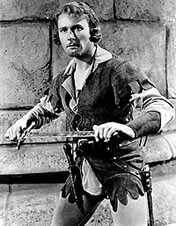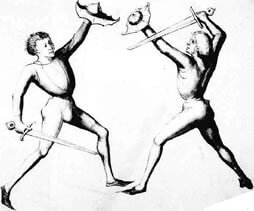Los Angeles Is Starring In an All-Too-Real Disaster Story
Indeed, the role was very much a reflection of his own state of mind. He had more than once been heard to say how much he disliked acting, which he called “a self-conscious business.” He described himself as “a screaming schizoid,” an introvert disguised as an extrovert.
But he continued to act. In “Scaramouche” (1952), a swashbuckler set in 18th-century France, he fought a climactic duel with Stewart Granger.
http://biblehub.com/proverbs/2-7.htm
其他版本都翻譯成SHIELD
New American Standard Bible
He stores up sound wisdom for the upright; He is a shield to those who walk in integrity,
King James Bible
He layeth up sound wisdom for the righteous: he is a buckler to them that walk uprightly.
starring
/ˈstɑːrɪŋ/
adjective
- denoting a principal role or performer in a film, play, or other show."his first starring role"
 buck・ler
buck・ler━━ n. 丸盾; 防御物.
swashbuckler (swŏsh'bŭk'lər, swôsh'-) 
から威張りする軍人; 向こうみずな男.
swash・buckling a., n. から威張り(する).
swashbuckler
n.
derring-do
noun [U] OLD-FASHIONED OR HUMOROUS
brave action taken without considering the danger involved:
deeds/feats of derring-do
Heroic daring.
Origin
 We now use 'derring-do' as a rather curious and archaic sounding two-part noun to describe 'ye olde' swordplay and the like. Use of the phrase was almost obligatory in any review of films starring the late Errol Flynn, who was surely the most audacious actor ever to swash a buckle. The fact that we come to have the word at all is actually due to a series of mistakes by a group of very eminent writers.
We now use 'derring-do' as a rather curious and archaic sounding two-part noun to describe 'ye olde' swordplay and the like. Use of the phrase was almost obligatory in any review of films starring the late Errol Flynn, who was surely the most audacious actor ever to swash a buckle. The fact that we come to have the word at all is actually due to a series of mistakes by a group of very eminent writers.
The earliest form of 'derring-do' in print is found in Geoffrey Chaucer's Troylus And Criseyde, circa 1374:
In reading the above, the celebrated Tudor poet Edmund Spenser appears not to have realised that derrynge was a misprint of durring, the meaning of which he would have been familiar with, and interpreted 'derrynge do' as meaning 'brave actions'. That was the way he used it in several of his late 16th poems, including his best-known work, The Faerie Queene, 1596:
 Incidentally, Flynn and his flamboyant colleagues weren't described as swashbuckling for no reason. 'Swash' was a 16th century term that referred to the noise braggarts made to simulate the sound of swishing weapons when pretending to swordfight. A buckler was a small round shield, usually fixed to the forearm. So, a 'swashbuckler' was a swaggering ruffian; someone very likely to swash his buckle.
Incidentally, Flynn and his flamboyant colleagues weren't described as swashbuckling for no reason. 'Swash' was a 16th century term that referred to the noise braggarts made to simulate the sound of swishing weapons when pretending to swordfight. A buckler was a small round shield, usually fixed to the forearm. So, a 'swashbuckler' was a swaggering ruffian; someone very likely to swash his buckle.

- A flamboyant swordsman or adventurer.
- A sword-wielding ruffian or bully.
- A dramatic or literary work dealing with a swashbuckler.
[Probably from the striking of bucklers in fighting.]
から威張りする軍人; 向こうみずな男.
swash・buckling a., n. から威張り(する).
swashbuckler
n.
- A flamboyant swordsman or adventurer.
- A sword-wielding ruffian or bully.
- A dramatic or literary work dealing with a swashbuckler.
[Probably from the striking of bucklers in fighting.]
swash・buckler
derring-do
noun [U] OLD-FASHIONED OR HUMOROUS
brave action taken without considering the danger involved:
deeds/feats of derring-do
Derring-do
MeaningHeroic daring.
Origin
 We now use 'derring-do' as a rather curious and archaic sounding two-part noun to describe 'ye olde' swordplay and the like. Use of the phrase was almost obligatory in any review of films starring the late Errol Flynn, who was surely the most audacious actor ever to swash a buckle. The fact that we come to have the word at all is actually due to a series of mistakes by a group of very eminent writers.
We now use 'derring-do' as a rather curious and archaic sounding two-part noun to describe 'ye olde' swordplay and the like. Use of the phrase was almost obligatory in any review of films starring the late Errol Flynn, who was surely the most audacious actor ever to swash a buckle. The fact that we come to have the word at all is actually due to a series of mistakes by a group of very eminent writers.The earliest form of 'derring-do' in print is found in Geoffrey Chaucer's Troylus And Criseyde, circa 1374:
"In durring don that longeth to a knight."Chaucer was using the two words 'durring' and 'don' with their usual 14th century meanings of 'daring' and 'do'. This line in his work translates into 20th century language as 'in daring to do what is proper for a knight'. The poet John Lydgate, paraphrased Chaucer in The Chronicle of Troy, 1430, and his 'dorryng do' was misprinted in later versions of the work as 'derrynge do'.
In reading the above, the celebrated Tudor poet Edmund Spenser appears not to have realised that derrynge was a misprint of durring, the meaning of which he would have been familiar with, and interpreted 'derrynge do' as meaning 'brave actions'. That was the way he used it in several of his late 16th poems, including his best-known work, The Faerie Queene, 1596:
"A man of mickle name, Renowned much in armes and derring doe."Last, but not least, make way for that inveterate plunderer of historic language, Sir Walter Scott. His use of 'derring-do' as a single word in the hugely popular novel Ivanhoe, 1820, cemented it into the language:
"Singular," he again muttered to himself, "if there be two who can do a deed of such derring-do!"
 Incidentally, Flynn and his flamboyant colleagues weren't described as swashbuckling for no reason. 'Swash' was a 16th century term that referred to the noise braggarts made to simulate the sound of swishing weapons when pretending to swordfight. A buckler was a small round shield, usually fixed to the forearm. So, a 'swashbuckler' was a swaggering ruffian; someone very likely to swash his buckle.
Incidentally, Flynn and his flamboyant colleagues weren't described as swashbuckling for no reason. 'Swash' was a 16th century term that referred to the noise braggarts made to simulate the sound of swishing weapons when pretending to swordfight. A buckler was a small round shield, usually fixed to the forearm. So, a 'swashbuckler' was a swaggering ruffian; someone very likely to swash his buckle.
The Phrase A Week newsletter goes out to 78,500 subscribers (60,500 by e-mail, 18,000 by RSS feed).
沒有留言:
張貼留言